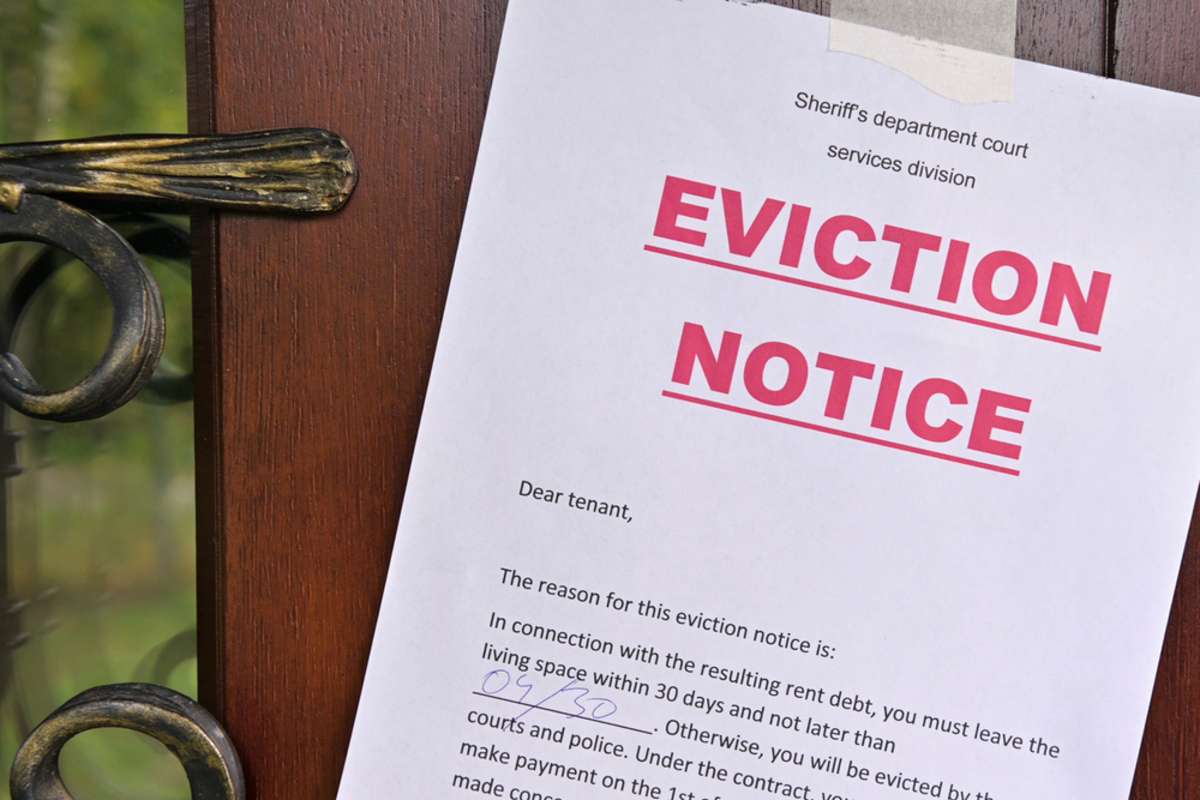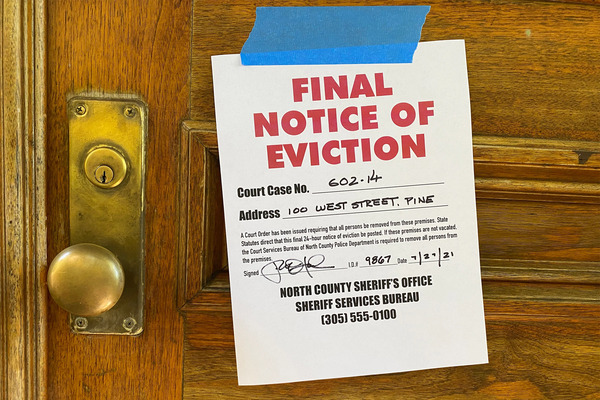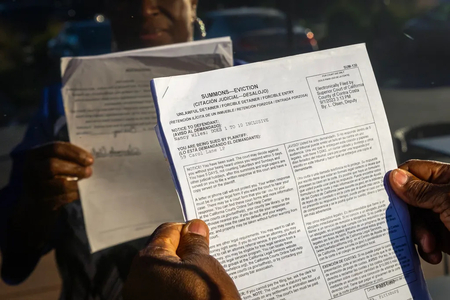The eviction process in Iowa has been updated in 2025 following the Iowa Supreme Court’s elimination of the 30-day notice requirement for nonpayment of rent. This change speeds up the timeline for landlords but also raises the stakes for ensuring compliance with proper notices and court procedures. To help landlords avoid costly delays or legal missteps, this guide by LeaseRunner covers latest updates, legal grounds, notices, required documents, and common mistakes to avoid.
Latest Updates in Iowa Eviction Laws
The landscape of Iowa eviction laws is subject to change, and staying informed is crucial for any landlord. The primary update for 2025, which has a significant impact on the eviction process in Iowa, revolves around a key ruling by the Iowa Supreme Court. This decision directly affects the notice period for nonpayment of rent, a common reason for a lease violation.

Iowa's new landlord-tenant laws have eliminated the 30-day notice requirement for nonpayment of rent evictions. This new rule stems from the Iowa Supreme Court's decision in MIMG CLXXII Retreat on 6th, LLC v. Miller. Before this ruling, many landlords were still following a lingering COVID-era rule from the federal CARES Act that required a 30-day notice to vacate. This created confusion and prolonged the eviction process, but the court's decision has now clarified and simplified the procedure for landlords.
Impact on Iowa Landlords:
- Elimination of the 30-Day Notice: The ruling explicitly states that the CARES Act's 30-day notice provision has lapsed and is no longer applicable. This is a major victory for landlord rights.
- Return to the 3-Day Notice: Iowa landlords can now revert to the standard state law, which only requires a 3-day notice to pay or quit for nonpayment of rent. This significantly shortens the initial phase of the eviction process in Iowa, allowing landlords to move more quickly toward resolving issues with non-paying tenants.
- Streamlined Legal Procedures: The decision removes a layer of complexity and potential for legal challenges. By returning to the state’s original statutes, the entire court procedure for nonpayment evictions becomes more predictable and efficient.
Legal Grounds for the Eviction in Iowa
The eviction process in Iowa is strictly guided by state eviction laws under Iowa Code chapters 562A (Uniform Residential Landlord and Tenant Law) and 648 (Forcible Entry and Detainer). Landlords must establish a valid legal reason before filing a case in court; otherwise, the eviction can be dismissed.

1. Nonpayment of Rent
Failure to make rent payment on time is the most frequent reason for eviction. If a tenant does not pay rent, the landlord may serve a 3-day notice to pay or quit. If the tenant still fails to pay, the landlord can proceed to file an unlawful detainer action in court to regain possession of the rental property.
Before signing a contract, landlords should run eviction checks on potential renters to reduce risk. This enables them to find applicants who have already been evicted or have a history of nonpayment of rent.
2. Lease Violations
A lease violation occurs when a tenant breaks the terms of the lease agreement, such as keeping unauthorized pets, causing property damage beyond normal wear and tear, or disturbing other tenants. In these cases, landlords generally issue a 7-day notice to cure or quit, giving tenants a chance to correct the violation. If the issue is not resolved, the landlord may continue with the legal procedures for eviction.
3. Holdover Tenancy (Staying After Lease Ends)
If a tenant remains in the property after the lease expires without the landlord’s consent, this is considered a holdover tenancy. Landlords may serve a 7-day or 30-day notice to quit. If the tenant does not leave, the landlord can seek a judgment through the eviction court process.
In some circumstances, either the landlord or the tenant may desire to end the contract early. For a detailed guide on how to handle these situations, including the legalities and potential penalties, refer to Early Lease Termination in Iowa.
4. Criminal Activity or Endangerment
Under Iowa law, landlords can move quickly if a tenant engages in illegal activity (such as drug use or violence) or poses a danger to others. In these cases, landlords can serve a 3-day unconditional quit notice, meaning the tenant must leave without an option to fix the violation.
Serving an Eviction Notice in Iowa
The initial step in the formal eviction process in Iowa is the proper service of a written notice to the tenant. This notice informs the tenant of the lease violation and the required action they must take to either remedy the situation or vacate the rental property.

1. Draft the Correct Notice
Before delivering the notice, it's crucial to select the right document based on the legal grounds for eviction process in Iowa. The types of eviction notice dictate the cure period and the next steps in the legal procedures.
- 3-Day Notice to Pay or Quit – for failure to make rent payment.
- 7-Day Notice to Cure or Quit – for a lease violation, such as unauthorized pets or property damage.
- Notice to Quit (Varied Lengths) – for holdover tenants or at-will tenancies, with timelines depending on the lease and rental type.
- Immediate Termination Notices – for illegal or dangerous activity, where the law allows landlords to move directly to legal procedures.
2. Deliver the Notice Properly
Iowa law specifies the acceptable methods for serving an eviction notice. To ensure the notice is legally binding, a landlord can serve it in one of the following ways:
- Personal Service: The notice is delivered directly to the tenant or a resident of the property who is at least 18 years old, and they sign and date an acknowledgment of receipt. This is a very secure method.
- Posting and Mailing: If personal delivery is unsuccessful, the landlord can post the notice on the main entrance of the rental property. This must be followed by sending a copy to the tenant via both regular mail and certified mail. The notice is considered served four days after it is deposited in the mail.
- Through a Third Party: For additional legal protection, many landlords choose to have the notice served by a disinterested third party, such as a process server or the county sheriff. This method provides an affidavit of service, which is a key piece of evidence for the court.
3. Document Proof of Service
Keeping records is crucial. Landlords should:
- Note the date, time, and method of service.
- Keep a copy of the notice.
- Consider using certified mail for an additional layer of proof.
This documentation helps landlords demonstrate compliance with legal procedures if the tenant challenges the eviction in court.
Step-by-Step Iowa Eviction Procedure
The eviction process in Iowa follows strict steps that landlords must complete in order. Missing any stage or ignoring tenant protections may cause the case to be dismissed in court. Below is a clear breakdown of each stage, from notice to regaining possession of a rental property.

1. Serve the Required Notice
Begin by giving the tenant the correct notice, whether it’s for nonpayment of rent, a lease violation, or holdover tenancy. This notice provides the tenant with an opportunity to comply or vacate before further legal action.
2. File the Eviction Petition
If the tenant does not comply with the initial notice (by paying rent or vacating the rental property), the landlord must file a lawsuit to legally reclaim possession. This is done by filing an “Original Notice and Petition for Forcible Entry and Detainer" with the local Iowa Small Claims Court in the county where the property is located. This document formally requests a court-ordered eviction and can also include a claim for unpaid rent and damages.
3. Attend the Court Hearing
Both landlord and tenant must appear before the judge on the scheduled hearing date. The landlord must bring the lease, proof of service, payment records, and any evidence of violations. The tenant has the right to present defenses under Iowa’s tenant rights.
4. Obtain the Court Judgment
If the judge rules in favor of the landlord, a judgment for possession will be issued. This judgment legally allows the landlord to take back control of the rental property. If the tenant wins, the eviction is dismissed, and the landlord may need to pursue other remedies.
5. Request the Writ of Possession
If the judge grants a Judgment for possession, the landlord is not yet authorized to remove the tenant. The landlord must take the judgment to the court clerk and request a "Writ of Possession." This is a legal order that commands the county sheriff to forcibly remove the tenant from the rental property if they do not vacate voluntarily. A landlord cannot take possession of the property or remove the tenant's belongings without this writ.
6. Coordinate with the Sheriff
The sheriff serves the writ and physically removes the tenant if they refuse to leave voluntarily. This step enforces the judgment while maintaining compliance with tenant protections under Iowa law.
Eviction Timeline & Costs in Iowa
The eviction process in Iowa typically takes place between 2–5 weeks. It involves multiple stages, each with its own timeframe, costs, and possible delays. Landlords should be prepared for court filing fees, sheriff service costs, and the risk of delays if tenants raise defenses under tenant rights or seek legal aid.
Required Documents for the Iowa Eviction Process
Proper paperwork is essential for a smooth eviction process in Iowa. Missing or incomplete documents can lead to delays, dismissal, or even a ruling in favor of the tenant.

Prepare the Lease Agreement
A signed lease is the foundation of your case. It proves the terms of the rental relationship, including rent payment amounts, lease duration, and the rules the tenant agreed to follow. Courts rely on this document to determine whether a lease violation occurred.
Original Notice and Petition for Forcible Entry and Detainer
This is the legal document that formally starts the lawsuit. It is filed with the court and serves as the official petition for eviction. The document details the reason for the eviction, identifies the parties, and requests a Judgment for possession of the rental property.
Gather Proof of Service
Landlords must prove that the eviction notice was delivered correctly. Acceptable proof includes signed delivery receipts, affidavits of service, or copies of mailed notices. This evidence ensures the court that the tenant received proper notification, in compliance with Iowa tenant protections.
Collect Payment Records and Evidence
If the eviction is for nonpayment or a lease violation, landlords should bring payment ledgers, bank statements, photographs, inspection reports, or witness statements. Strong evidence helps secure a favorable judgment during the court hearing.
5 Tips to Avoid Common Eviction Mistakes
Landlords can face significant setbacks if they make mistakes during the eviction process in Iowa. Even a minor error in procedure or documentation can lead to a case being dismissed, forcing the landlord to start over and incur additional costs. Here's a practical checklist to help you avoid common pitfalls.

Use the Correct Eviction Notice
The type of notice you issue must correspond directly to the reason for the eviction, such as nonpayment of rent or a lease violation. Using a generic or incorrect form can invalidate the entire proceeding. Always verify that you're using the correct notice for the specific situation, as outlined by Iowa law.
Serve the Notice Properly
Iowa law has specific rules on how an eviction notice must be delivered. Simply sliding it under the door is not enough. You must either deliver it personally to the tenant, post it on the property, and send it via certified and regular mail, or hire a professional process server. Failure to follow these service requirements is a leading cause of dismissed eviction cases.
Avoid “Self-Help” Evictions
It is illegal for a landlord to change the locks, turn off utilities, or remove a tenant's belongings to force them to leave. These actions are considered "self-help" evictions and can result in the landlord facing serious legal and financial penalties, including being sued by the tenant. The only legal way to evict a tenant is by following the formal eviction process in Iowa through the court system.
Maintain Thorough Documentation
Keep meticulous records of everything: a signed copy of the lease agreement, a detailed rent ledger, copies of all notices with proof of service, and any written communication (emails, texts) related to the Lease Violation. This paper trail will be your most valuable asset during the court hearing.
Seek Legal Advice When in Doubt
The legal landscape of landlord-tenant law can be complex. While this guide provides a general overview, every situation is unique. If you're unsure about any step in the process, it's always best to consult with a qualified attorney who specializes in Iowa landlord-tenant law. A small investment in legal counsel upfront can save you a significant amount of time, money, and stress in the long run.
Conclusion
The eviction process in Iowa is a legal procedure that requires precision and a full understanding of state law. For landlords, staying informed about updates is not just a best practice, but a necessity for protecting their investment. By correctly identifying the legal grounds for eviction, serving the proper notice, and meticulously documenting every step, landlords can navigate this challenging process effectively and in full compliance with the law.
Using a reliable platform like LeaseRunner for thorough tenant screening, online rental applications, and digital lease agreements can significantly reduce the risk of needing to initiate an eviction in the first place.
FAQs
1. How long does the eviction process in Iowa usually take?
The timeline can range from 3–6 weeks, depending on notice periods, court scheduling, and sheriff availability. Delays may occur if the tenant contests the case.
2. What are tenant rights during the eviction process in Iowa?
Tenants have the right to receive proper notice, attend the court hearing, and present a defense. They are also protected from unlawful “self-help” evictions, such as lockouts or utility shutoffs.
3. How much does it cost to evict a tenant in Iowa?
Costs vary, but landlords can expect to spend $150–$400 for court and sheriff’s fees, not including attorney costs if legal aid is needed.
4. Can a landlord evict a tenant without going to court in Iowa?
No. Landlords must follow the formal court process to legally remove a tenant. Attempting to bypass the court violates tenant protections.
5. Can a tenant stop an eviction by paying rent after the notice is served?
Yes. If the tenant receives a 3-day notice for nonpayment of rent, they can stop the eviction process by paying the full amount of overdue rent within those three days. Once the grace period on the notice expires, the landlord is not required to accept the payment and can proceed with filing the lawsuit.



